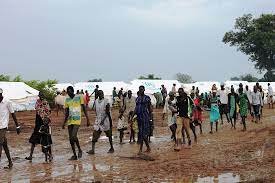Severe Socioeconomic Impacts of War on Urban Households in Sudan Revealed by UNDP-IFPRI Study
Study Highlights Displacement, Economic Decline, and Widespread Loss of Access to Essential Services Amid Ongoing Conflict.

A new study from the United Nations Development Programme (UNDP) and the International Food Policy Research Institute (IFPRI) has shed light on the devastating socioeconomic effects of the ongoing conflict on urban households in Sudan. The study, titled "The Socioeconomic Impact of Armed Conflict on Sudanese Urban Households," reveals the profound toll that 18 months of war have taken on the country's cities. The findings underscore the widespread displacement, economic collapse, and severe disruption to essential services, with deepening vulnerabilities and limited support for urban populations.
The research, based on a survey of 3,000 households conducted between May and July 2024, highlights that 31 percent of urban households have been displaced, and half of the population has lost full-time employment. The situation has further worsened for school-aged children, with over 70 percent of households reporting that children have ceased attending school. Moreover, only one in seven urban households now has access to full health services.
The Impact on Food Security and Employment
According to Khalid Siddig, Senior Research Fellow and Program Leader at IFPRI, the conflict has exacerbated food insecurity, with urban food security rates plummeting. Prior to the conflict, 54 percent of the population was food secure; by mid-2024, that number had fallen to just 20 percent. With many households experiencing a loss of income and employment, Sudan has become one of the countries with the highest rates of acute malnutrition, now estimated at 13.6 percent.
The report also indicates that 18 percent of urban households now have no income or employment, a dramatic increase from just 1.6 percent before the conflict. Unemployment is expected to exceed 45 percent by the end of 2024. As of now, 56 percent of urban households report poorer health compared to pre-conflict levels, while access to full health services has decreased drastically—from 78 percent to 15.5 percent.
Growing Vulnerabilities and Lack of Assistance
While the proportion of people receiving assistance has increased during the conflict, the study reveals that a significant 76 percent of the population received no assistance at all, relying instead on personal networks for support. This reliance on informal support systems underscores the limited effectiveness of official humanitarian responses. Luca Renda, UNDP Resident Representative in Sudan, emphasized the need for long-term development interventions alongside immediate relief efforts, stating that "no single intervention can adequately address this unfolding and multifaceted development crisis."
Urgent Actions Required for Recovery
The study calls for a comprehensive, multi-sectoral approach to address Sudan’s pressing challenges, which should go beyond immediate humanitarian relief and focus on sustainable recovery. Some key actions identified include:
Economic Recovery Programs: Prioritizing microfinance, small business support, and vocational training to stabilize self-employment and foster long-term economic resilience.
Urban Agricultural Initiatives: Expanding programs to diversify food sources and ensure sustainable access to nutritious diets.
Healthcare Access: Deploying mobile health clinics and restoring and expanding affordable healthcare services.
Education: Restoring remote learning solutions, rebuilding the education system, and providing financial support to families to prevent further harm to Sudan’s future workforce.
Infrastructure Development: Investing in decentralized systems like solar energy, rainwater harvesting, and local sanitation while restoring water, sanitation, and electricity infrastructure.
Social Protection Programs: Expanding formal social protection systems to reduce reliance on informal networks and ensure that aid reaches the most vulnerable.
Support for Displaced Households: Prioritizing housing, healthcare, and livelihood opportunities for displaced populations.
Additional Key Findings from the StudyAcute Malnutrition: Sudan now ranks among the four countries with the highest rates of acute malnutrition, with 13.6 percent of children affected.
School Attendance: 63.6 percent of urban households reported that all their school-age children have ceased attending school, and over 88 percent reported at least one child out of school due to the conflict.
Deteriorating Infrastructure: Access to piped water has fallen from 72.5 percent to 51.6 percent, and nearly 90 percent of urban households reported worsening reliability of electricity supply.
The findings of this study underscore the urgent need for a coordinated, multi-dimensional response that addresses both the immediate humanitarian crisis and the longer-term development challenges that Sudan faces. Without such a holistic approach, Sudan's urban households will continue to suffer the long-term effects of conflict, leaving future recovery efforts severely hampered.
- READ MORE ON:
- International Food Policy Research Institute
- Sudan
- UNDP










